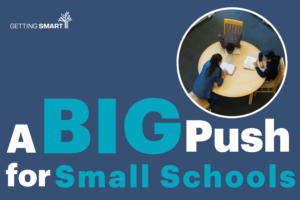6 Innovations in Social Emotional Learning

Social emotional learning “teaches the skills we all need to handle ourselves, our relationships, and our work, effectively and ethically,” says Collaborative for Academic, Social, and Emotional Learning (CASEL). CASEL was formed almost two decades ago started by CEO Roger P. Weissberg who is also professor at UIC. In addition to Weissberg, CASEL’s agenda has been influenced by Daniel Goleman, author of Emotional Intelligence.
As recently noted, these so-called non-cognitive skills are really important–just badly named. CASEL defines social emotional learning (SEL) as:
- Self-management : Managing emotions and behaviors to achieve one’s goals
- Self-awareness : Recognizing one’s emotions and values as well as one’s strengths and challenges
- Social awareness : Showing understanding and empathy for others
- Relationship skills : Forming positive relationships, working in teams, and dealing effectively with conflict; and
- Responsible decision making : Making ethical, constructive choices about personal and social behavior.
Before joining CASEL, Paul Goren, Vice President for Research and Knowledge Use, spent almost a decade leading education research efforts at the Spencer Foundation. As a former teacher, he wants everything CASEL does to have a positive impact on teachers and classrooms. As a parent of three teenagers, he has his own SEL laboratory at home. Goren’s counterpart on the program side is another veteran educator, Libby Gil.
In September they released the 2013 CASEL Guide Effective Social and Emotional Learning Programs. The report cites a meta analysis of more than 200 studies showed that students receiving quality SEL programming scored higher on traditional tests, had improved commitment to school, and had fewer discipline problems and experienced less depression.
CASEL is supporting the SEL work of 8 school districts in the following cities: Anchorage, Austin, Chicago, Cleveland, Nashville, Oakland, Reno, and Sacramento.
This week Linda Pittenger, CCSSO, hosted a meeting to discuss measuring SEL. The network of lab districts that Linda runs working with David Conley on defining college and career readiness. They have developed a useful framework of knowledge, skills, and dispositions. Similar to Turnaround for Children, the dispositions include a growth mindset, a sense of social efficacy, and the ability to regulate academic behaviors.
Dan Cardinali, Communities in Schools, and I were encouraged by broad-based progress exhibited at the CCSSO meeting–the maturation of work funded by the Raikes, Hewlett, Stupski, and Nellie Mae Foundations. The discussion suggested that there are six emerging areas of SEL innovation:
- Professional development : See a list of more than 25 resources from EdWeek
- Counseling tools : Advisory curriculum like Navigation 101
- Behavior management : Classroom tools like Kickboard, Class Dojo, and pbis
- Measures : See this Raikes Foundation report on SEL metrics
- Early warning systems : Washoe (Reno) is developing a risk identification system; and
- Reflection tools : See a list of CASEL tools.
CASEL has reviewed hundreds of programs and tools to develop the following recommended list of K-12 SELect Programs:
- 4Rs
- Caring School Community
- Competent Kids, Caring Communities
- I Can Problem Solve
- The Incredible Years Series
- Michigan Model for Health
- MindUP
- Open Circle
- PATHS
- Positive Action
- Raising Healthy Children
- Resolving Conflict Creatively Program
- Responsive Classroom
- RULER Approach
- Second Step
- Social Decision Making/Problem Solving Program
- Steps to Respect
- Too Good for Violence
- Tribes Learning Communities
AIR is evaluating the 8 district initiative. In the process of doing this work it is working with CASEL and the districts to develop a practical and valid tool for assessing students social emotional competence.
CASEL is supporting multiple SEL strategies and encourages its district partners to do the same. Goren said, “The key is for SEL strategies to be embed and integrated across the curriculum.” SEL should be integrated but these metacognitive skills, as David Conley calls them, deserve to be central to an advisory curriculum for secondary students and should be part of student-led parent-teacher conferences. The CASEL and CCSSO supported districts are developing great examples of integrated SEL, advisory, and conferences. With common measures and better tools, more students will leave high school ready to succeed in college and careers.
This blog first appeared on EdWeek.








0 Comments
Leave a Comment
Your email address will not be published. All fields are required.